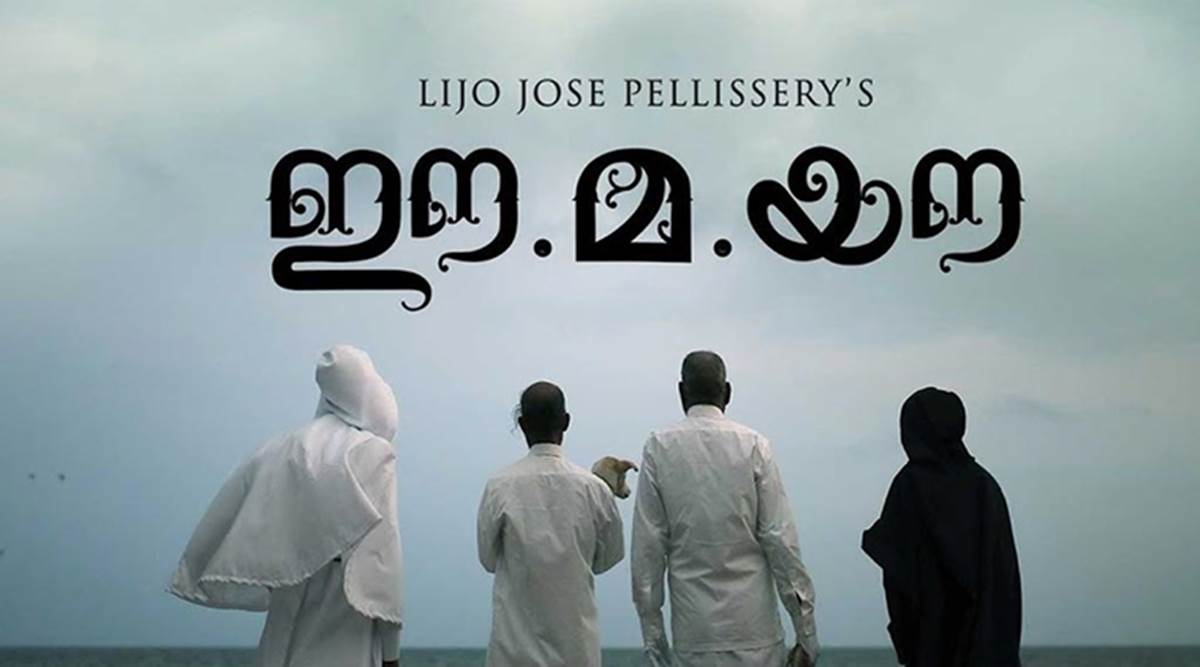
Lijo Jose Pellissery efficiently elevates P.F. Mathews’ satire to a cold yet colourful craftwork. The director serves us the topic of death brilliantly through the very minute details which we pass off /skip under the pretext of storytelling. Every second of the movie is worthwhile and doesn’t let you down.
The opening shot is of a band, a group of priests walking alongside a beach on a bright day, only to be overshadowed by the murky clouds in a while, to set the mood of the movie.Eeshi, Vavachan’s son engages in an inebriated conversation over arrack about death and funeral, and how Vavachan would die to have a grand funeral. Eeshi promises his father a grand funeral when the time comes. The tension and chaos can be sensed right from the start, but we’re eased into the topic of death by the conversation between the father and son.
There are four deaths, around which our story unravels. First a duck, that ends up being a curry at the house of Vavachan, who dies later, then a man who digs graves at the church, and finally, a dog. The star of the movie is realism, which Lijo maintains throughout, letting the movie to speak on its own rather than being preachy about the subject.The black humour of which makes us guilty of laughing at the sombre setup. We hear the daughter in law say that she’ll find something that helps Vavachan stay at home, little did she know that Vavachan’s theatrical with arrack running parallely would be his ascension time.
The first half of the movie is shot in natural light, staying close to the actual gloominess of the night. The village is taken over by the darkness owing to power cut, stepping into the darkness of our plot. Amidst his wailing sister and mother, Eeshi, without a second to spare to mourn, is racing against time, weather and money to fulfil his father’s promise. He resorts to the go to way to attain money, selling wife’s jewellery. The downhearted mood of the house is not devoid of realism either. The mother in law taunts the daughter in law about dowry, and daughter in law wears a borrowed necklace to avoid people talking about “an empty neck” which equals low social status. The jaw drops of the dead body, as if gasping for air, for the head wasn’t tightly tied up by the nurse.
The peculiarity of human existence and its inevitable inexistence gets to the audience slowly yet it makes you giggle at the quirks of someone’s mourning and grief.The gossip mongers weave a story that this wasn’t a natural death, with random over hears and mostly assumptions, everyone plays their part naturally. The doctor, the nurse the priest, neighbours etc.
Even we try to test our grasping abilities to cross check if we missed something in the course of time that could substantiate these rumours.Eeshi is seen hustling to arrange money, to buy a coffin, arrange a band, photographers for the funeral service, and convincing the priest that it was natural death etc.As Eeshi struggle to get the business done, we’re edging too, with the mishap that is happening with him and back at home, only to be weathered down severely.
The coffin breaks while trying to get Vavachan out in the tent, the rain starts pouring through the tent, the band is interrupted by a familyfeud that sparks with a second family that claims to be Vavchan’s.As the chaos edges, it wears down Eeshi’s threshold.We feel a sense of calm seeing him finally unleash all his suppressed emotions. Anger, as he couldn’t do what he desired; frustration, for every element in the universe was working against him; helplessness, at the sense of his perceived masculinity or its failure and sadness, at the loss of his father.
He digs a grave for his father amidst the pouring rain while everyone tries to stop him from this insanity.Chemban and Lijo wraps up the movie with that grave, how everyone, with all or no luxuries ends up in a grave, with no distinction.Ee ma yau clearly depicts how human emotions are intertwined and it can all accelerate or decelerate one another.
How even in that small coastal area, that small house, such a whirlwind exists. How gossip builds on, how people want their share over a dead body too, how a tragedy to someone would be an everyday scene for someone and many try to cash it out, how power and authority works as slow as a routine whilst it’s a life struggle for someone, how humans are just what they are between a name someone gave them until their last breath- you’re suddenly just a dead body awaiting to meet the soil, how patriarchy doesn’t allow room for men to weep and grieve only to bottle up and when it finally comes out, it’s harmful for oneself and others. Just as the bundle of notes (pre demonization money) mentioned in the movie, humans share exactly one feature with them, everything perishes with time.